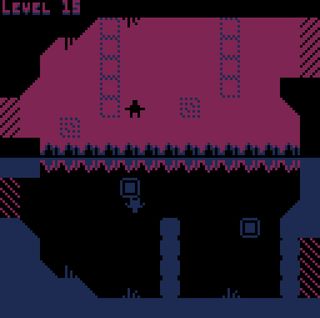
In smart platformer ORUL, a shadow isn't just a blob of shade that follows you around: it's a mirror image that copies everything you do, and it resides in another realm that doesn't always have the same geography as the real world.
In this minimalist platformer, the screen is split in half. The top half is the world of light, and the bottom is the realm of darkness (although you can change the colour palette so it's not so, er, black and white). As you move a little pixel character, their shadow follows suit, in an inverted fashion, jumping down the screen when they jump up it, while still moving in the same horizontal direction.
However, there's one element of the formula that doesn't quite adhere to reality. Each figure will react to terrain that doesn't exist on their side of the screen, flailing awkwardly in mid-air, as if the platform was present in their dimension too.
This discrepancy is quickly mined for puzzle goodness, first with this asynchronous geometry, and then with moving platforms, platforms that switch on and off, and so on. It's a co-op puzzler where the other player is a clone of you, where you have to keep your eye on two versions of a world simultaneously, each connecting with the other in clever ways. It's good stuff, and there are loads of other interesting little browser games on the developer's site to try afterwards. (Thanks, Warp Door.)
For more great free experiences, check out our roundup of the best free PC games.
PC Gamer Newsletter
Sign up to get the best content of the week, and great gaming deals, as picked by the editors.
Tom loves exploring in games, whether it’s going the wrong way in a platformer or burgling an apartment in Deus Ex. His favourite game worlds—Stalker, Dark Souls, Thief—have an atmosphere you could wallop with a blackjack. He enjoys horror, adventure, puzzle games and RPGs, and played the Japanese version of Final Fantasy VIII with a translated script he printed off from the internet. Tom has been writing about free games for PC Gamer since 2012. If he were packing for a desert island, he’d take his giant Columbo boxset and a laptop stuffed with PuzzleScript games.
Most Popular




